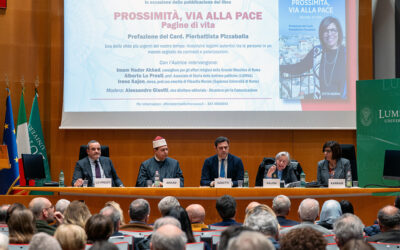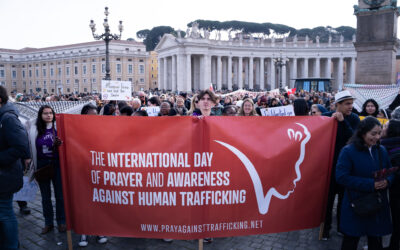 Eversince she was little, Lucia was a child who radiated an uncontrollable and contagious joy. The youngest after eight brothers, she grew up in a very poor family in Terlano (Bolzano-Italy). Inspite of the economic difficulties, the Degasperi couple always maintained a strong faith. As the years passed, nevertheless, Lucia was convinced that love does not exist on earth and the thought of loving without being loved in return frightened her. When Lucia was twenty years old, her brother Carlo suddenly changed his way of acting at home: he started to make the beds, shine the shoes. She became curious and asked him to explain why he was acting that way and so she found herself invited to go to the Mariapolis, a meeting of several days of the Focolare. Lucia is profoundly touched by the many concrete experiences based on the certainty that God is love and that He loves everyone personally, so much so that, frightened, she leaves the meeting early. But a sentence remains imprinted within her: “Whatsoever you do to the least, you did it to me” (Mt 25, 40). She started to live it seriously. And consequently she felt that God was calling her to follow him in the focolare. From 1964, when the spirituality of unity started to spread in Germany, Lucia was in West Berlin and afterwards in the early ‘80s she was in the GDR, a land where the situation of the regime forced many adherents of the spirituality of the Focolare to meet in a semi-clandestine way and with much difficulty. Lucia also had to spend a month in a Military Camp, before moving to Leipzig. The other inmates were soon touched by her love: she rearranged the common room and offered them the coffee that she was planning to bring to Leipzig. Gradually many others started to follow her example and on her last day there one of the guards confided to Lucia: “I have never had a group as beautiful as this…”. With the telephone being monitored and with the hidden microphone in the car, Lucia uses her creativity, inventing a thousand strategies to meet the people that have been entrusted to her: She invited children to lunch, organized parties for the youth, made many visits to families.
Eversince she was little, Lucia was a child who radiated an uncontrollable and contagious joy. The youngest after eight brothers, she grew up in a very poor family in Terlano (Bolzano-Italy). Inspite of the economic difficulties, the Degasperi couple always maintained a strong faith. As the years passed, nevertheless, Lucia was convinced that love does not exist on earth and the thought of loving without being loved in return frightened her. When Lucia was twenty years old, her brother Carlo suddenly changed his way of acting at home: he started to make the beds, shine the shoes. She became curious and asked him to explain why he was acting that way and so she found herself invited to go to the Mariapolis, a meeting of several days of the Focolare. Lucia is profoundly touched by the many concrete experiences based on the certainty that God is love and that He loves everyone personally, so much so that, frightened, she leaves the meeting early. But a sentence remains imprinted within her: “Whatsoever you do to the least, you did it to me” (Mt 25, 40). She started to live it seriously. And consequently she felt that God was calling her to follow him in the focolare. From 1964, when the spirituality of unity started to spread in Germany, Lucia was in West Berlin and afterwards in the early ‘80s she was in the GDR, a land where the situation of the regime forced many adherents of the spirituality of the Focolare to meet in a semi-clandestine way and with much difficulty. Lucia also had to spend a month in a Military Camp, before moving to Leipzig. The other inmates were soon touched by her love: she rearranged the common room and offered them the coffee that she was planning to bring to Leipzig. Gradually many others started to follow her example and on her last day there one of the guards confided to Lucia: “I have never had a group as beautiful as this…”. With the telephone being monitored and with the hidden microphone in the car, Lucia uses her creativity, inventing a thousand strategies to meet the people that have been entrusted to her: She invited children to lunch, organized parties for the youth, made many visits to families.  In 1989 the focolarinas and the gen girls (the youth of the focolare) of the GDR celebrated the fall of the Berlin wall by taking a long trip to Trent and to Rome, where many of them, meet Chiara Lubich for the first time. What followed were years of a great launching, but unexpectedly in 1994, Lucia was diagnosed with cancer. It was a very painful suffering for her as she would share years later: “It was a death sentence”. It took time for her to understand that “the moment had come to re-entrust my life to God”. Living the present moment was a great help for her and she became a source of light for many. The years passed, and as her physical strength diminished, her spiritual strength increased. “I won’t tell you ‘take courage Lucia’ – Chiara Lubich wrote to her on the 3rd of December, 2003 – you have all the graces that you need and even more. Just be happy”. On the 10th of December, Lucia leaves for Heaven in great serenity. “Thank you for the concrete love that you have always had”; “Thank you for your smile that always created the family”; “Thank you for your strength”, these were just some of the many, many messages that rained down from all over in the days that followed her passing.
In 1989 the focolarinas and the gen girls (the youth of the focolare) of the GDR celebrated the fall of the Berlin wall by taking a long trip to Trent and to Rome, where many of them, meet Chiara Lubich for the first time. What followed were years of a great launching, but unexpectedly in 1994, Lucia was diagnosed with cancer. It was a very painful suffering for her as she would share years later: “It was a death sentence”. It took time for her to understand that “the moment had come to re-entrust my life to God”. Living the present moment was a great help for her and she became a source of light for many. The years passed, and as her physical strength diminished, her spiritual strength increased. “I won’t tell you ‘take courage Lucia’ – Chiara Lubich wrote to her on the 3rd of December, 2003 – you have all the graces that you need and even more. Just be happy”. On the 10th of December, Lucia leaves for Heaven in great serenity. “Thank you for the concrete love that you have always had”; “Thank you for your smile that always created the family”; “Thank you for your strength”, these were just some of the many, many messages that rained down from all over in the days that followed her passing.
Persevere in trials
Persevere in trials




0 Comments